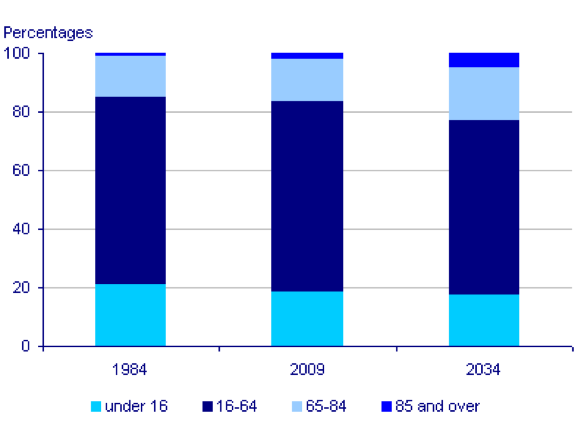And so Danny Alexander has further angered unions by making it clear that “painful decisions” are needed to reform public-sector pensions, including raising the retirement age. But his proposals should no come as a surprise. Rapid demographic transitions caused by rising life expectancy and declining fertility mean that the proportion of old to young is growing rapidly. But when the Lib Dem minister says that “people are living much longer now,” he is in fact underplaying how dramatic the change has been in the last decade.
According to the Office of National Statistics, the proportion of people in Britain aged 65-and-over increased from 15 per cent in 1984 to 16 per cent in 2009, an increase of 1.7 million people. Over the same period, the percentage of the population aged under-16 decreased from 21 per cent to 19 per cent:

The ONS expects the trend to continue. By 2034, 23 per cent of the population will be aged 65-and-over, compared to 18 per cent aged under 16. Even more remarkable is the increase in those aged 85-and-over. In 1984, there were around 660,000 people aged in this group. The projections have it at 3.5 million in 2034 — 5 per cent of the total population.
Strangely enough, pension ages had been falling for decades, until relatively recently. For men, they declined by 2.5 years between 1958 and 1999, to just under 62 on average in OECD countries. Earlier retirement ages and longer lives have resulted in the average amount of time spent in retirement increasing by 5.6 years from 1958.
But now other countries have done what the British government is proposing, and lifted the retirement age. The Czech Republic, Greece, Hungary and Turkey have all recently announced increases in the normal pension age to 65. And, in the past five years, some countries have set out phased plans to increase the pension age beyond 65: Australia and Germany to 67; Denmark will increase pension age to 67 and then link it to life expectancy; Iceland, Norway and the United States already have, or plan to have, normal pension ages above 65. On this front at least, Alexander is not alone.






Comments